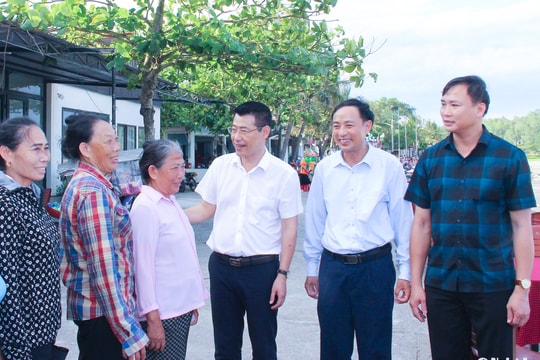By 2025, the policy of Party Secretary not being a local person will be completely implemented.
According to the Drafting Committee of Central Project 7 on personnel work, by the 2020-2025 term, this policy will be thoroughly implemented nationwide.
One of the breakthrough solutions in personnel work in the coming years is to consistently implement the policy that the Secretary of the provincial and district Party Committees must not be local people, and encourage this to be applied to other positions, especially the position of Chairman of the People's Committee.
This content received quite a lot of support at the 7th Central Conference of the 12th term. So up to now, how have we implemented the above policy and when will 100% of provincial and district secretaries not be local people?
|
| By the 2020-2025 term, the policy of Party Secretary not being a local person will be thoroughly implemented. Illustrative photo |
From the 9th term (2000-2005) up to now, the Politburo and the Secretariat have issued many conclusions to promote the implementation of cadre rotation combined with the policy of arranging leaders at all levels who are not local people.
Specifically, from 2000 to 2005, the Politburo piloted the policy of rotating and arranging 6 positions of cadres of Ha Tay province (old) who were not local people, including: Provincial Party Secretary, Chairman of the People's Committee, Director of Public Security, Director of the Department of Planning and Investment, Finance, and Chief Prosecutor of the People's Procuracy. The simultaneous rotation of 6 positions of cadres who were not local people created a new movement and momentum. This was also the basis for this locality to rotate and change cadres at the district and commune levels... The selection of cadres for rotation was carried out strictly. These were cadres with capacity, prospects, the spirit of daring to think, daring to do, daring to face difficulties...
At that time, Ha Tay province was a locality with many advantages but its economy developed slowly, showing signs of stagnation and instability, especially in terms of security and order, and the situation of mass complaints, bypassing authorities, and resisting law enforcement officers continuously occurring in some places. The effectiveness of the government apparatus, the role of party cells, party committees, the Fatherland Front and mass organizations in some places were neutralized, becoming hot spots for rural security. People's trust in party committees and provincial leaders decreased. After a period of rotating 6 positions at the same time in this locality, the result was that the situation of instability and stagnation in Ha Tay's socio-economic development was resolved.
Non-local Party Committee cadres: Implemented consecutively for 4 terms
Also since the 9th term until now (since 2000), hundreds of cadres have been transferred to localities, many of whom hold the highest positions (Secretary of Provincial Party Committee, City Party Committee).
During the 2000-2005 term, the Central Committee rotated 23 cadres, of which 16 out of 64 Provincial and Municipal Party Committee Secretaries were not local people (accounting for 25%). After rotation, 15 cadres were assigned higher positions, of which 5 were elected to the Politburo.
During the 2005-2010 term, the Central Committee rotated 39 cadres, including 16 Provincial and Municipal Party Secretaries who were not local. After the rotation, 14 people were assigned to higher positions, including 1 elected to the Secretariat (Mr. Nguyen Hoa Binh), 1 Vice President (Ms. Dang Thi Ngoc Thinh) and 1 Deputy Prime Minister (Mr. Vu Duc Dam).
Term 2010-2015: The Central Committee rotated 57 cadres, including 16 Provincial and Municipal Party Secretaries who were not local. After rotation, 12 cadres were assigned higher positions, including 2 cadres elected to the Politburo (Mr. Pham Minh Chinh, Mr. Vo Van Thuong).
Since the beginning of the 2015-2020 term, the Central Committee has rotated, arranged and assigned 11 Provincial and Municipal Party Secretaries who are not local people, including 3 Politburo members.
For the position of Chairman of the Provincial People's Committee for the 2016-2021 term, the Central Government has transferred 4 people who are not local people.
At the district level, in the 2010-2015 term alone, more than 40% of District Party Secretaries and more than 47% of District People's Committee Chairmen were not local people. 24 provinces and cities had over 50%, of which 8 provinces and cities had over 75% of Secretaries not being local people, 25 provinces and cities had over 50% of District Chairmen not being local people.
|
| Mr. Pham Minh Chinh - Head of the Central Organization Committee presented the Politburo's decision of assignment to Mr. Nguyen Quang Duong - Secretary of the Party Committee of Central Agencies - to hold the position of Secretary of the Bac Lieu Provincial Party Committee for the 2015-2020 term. Mr. Nguyen Quang Duong is from Hoai Duc, Hanoi. |
The police, army, and People's Procuracy also conduct rotation.
Along with the rotation of Party Committee cadres who are not local people, in recent years, the Central Military Commission has also arranged for 35% of Provincial Military Command Commanders and over 60% of Provincial and Municipal Border Guard Commanders to be non-local people. The Central Public Security Party Committee has rotated more than 3,100 cadres at all levels, including 43/63 Provincial Police Directors and 701/710 District Police Chiefs who are not local people. The Supreme People's Procuracy has also rotated 16 cadres from the Supreme People's Procuracy to become Chief Prosecutors and Deputy Chief Prosecutors at the provincial level, and rotated 466 provincial professional department cadres to become Chief Prosecutors and Deputy Chief Prosecutors at the district level.
Prevent localism, family, relatives, and group interests
According to the assessment of the Drafting Committee of the Central Project 7 on personnel work, over the past 3 terms, the rate of arranging Provincial Party Committee Secretaries and City Party Committee Secretaries who are not local people is not high. However, the results show that the implementation of this policy is correct and effective. At conferences and seminars to contribute ideas to the Central Project 7 on personnel work, most Provincial Party Committee Secretaries gave good assessments and suggested consistent implementation, while at the same time, both the positions of Party Committee Secretary and Chairman of the People's Committee at the provincial and district levels are not local people.
In practice, non-local cadres have many advantages and advantages in their work, especially in preventing risks, preventing localism, relatives, and group interests, affecting the cadre work and the management of local socio-economic activities. Local cadres, even if they are objective and want to be honest, sometimes find it difficult to do so because they are influenced by existing relationships. Therefore, to ensure feasibility, effectiveness and great influence, the Project only focuses on the position of Secretary of the provincial and district Party Committees who are not local people to be determined to implement it; at the same time, it is encouraged to be implemented for other positions. In fact, neighboring countries with the same regime as Vietnam such as China and Laos have done this for a long time.
|
| Mr. Pham Minh Chinh - Head of the Central Organizing Committee presented the Politburo's decision to transfer Mr. Lai Xuan Mon - Chairman of the Vietnam Farmers' Union to hold the position of Secretary of the Cao Bang Provincial Party Committee for the 2015-2020 term. Mr. Lai Xuan Mon is from Nam Dinh. Photo: Chinhphu.vn |
Immediately after the 7th Central Conference, the policy of Party Secretary at all levels not being a local person will be implemented consistently.
According to the Project Drafting Committee, the goal is to basically arrange provincial and district Party Secretaries who are not local people by 2020. By the 2020-2025 term, this policy will be completely implemented nationwide.
Accordingly, the Central Organizing Committee and the Organizing Committees of Party Committees at all levels must promptly, promptly, and with great determination advise Party Committees at all levels, the Politburo, and the Standing Committees of the provinces to review and evaluate the entire staff in the resource planning to consider and prepare personnel as soon as possible, not waiting until 2019-2020 to start building a personnel work direction, arranging and assigning tasks. This work will be carried out immediately after the Resolution of the 7th Central Conference is issued, immediately starting to arrange and calculate personnel plans. It is possible that by the upcoming Congress, there will be cadres who are still elected locally, but after the Congress, they will be rotated to properly implement the Party's policies.
Human resource allocation must be done in the spirit of careful consideration, selection, and arrangement, and most importantly, choosing the right person with the right qualities, abilities, prestige, and ability to take on the assigned tasks.
According to the standards for cadres, especially strategic cadres, the requirement is: Key leaders at the upper level must have gone through key leaders at the lower level. Thus, rotation becomes a mandatory requirement. Second, the rotation must be at the head level because that is the level that makes decisions.
The Central Organizing Committee will advise the Politburo and the Secretariat to arrange the positions of Provincial and Municipal Party Secretaries who are not local people. The positions of Deputy Secretary and Provincial Chairman will be submitted to the Secretariat. The Provincial Party Standing Committee will arrange District Secretaries who are not local people.
The representative of the Central Committee’s Drafting Committee for Project 7 on personnel work said that currently, the planning resources for all Provincial Party Committees, City Party Committees, ministries and branches are available because we already have the Central Executive Committee planning. The most important thing is to accurately assess cadres and select the right cadres who meet practical requirements. Thus, the role of advising, assessing and surveying cadres is very important./.


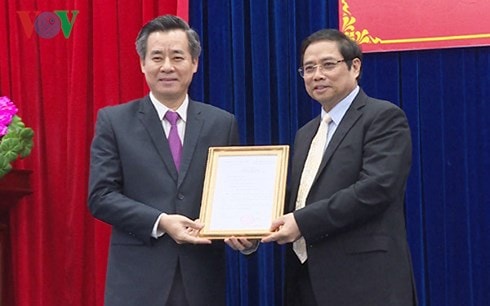
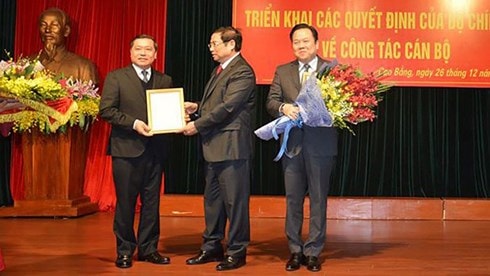
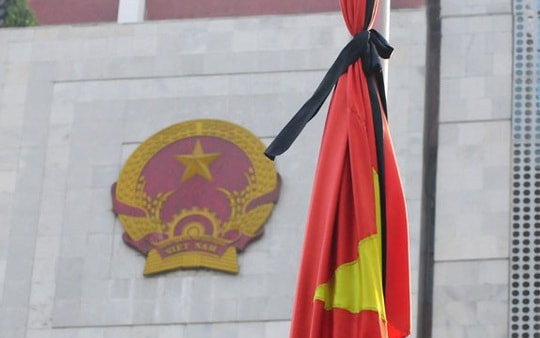
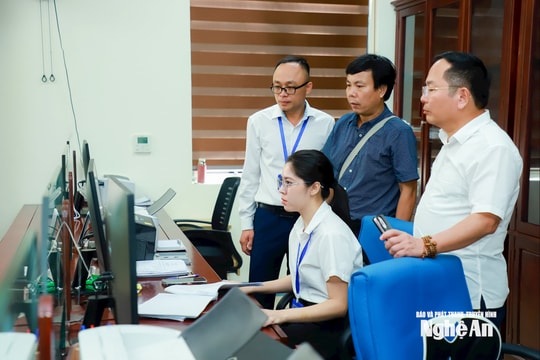
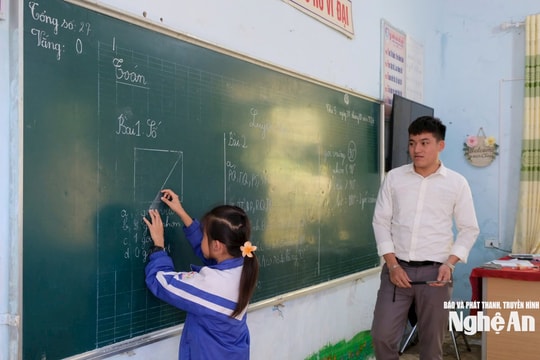
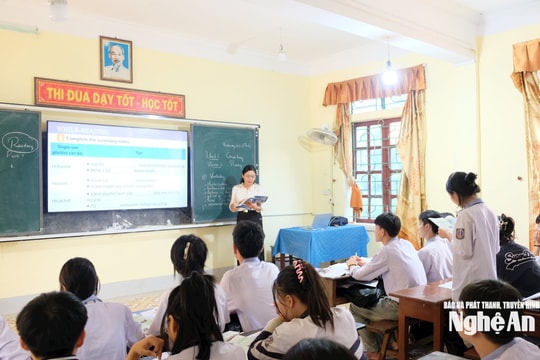
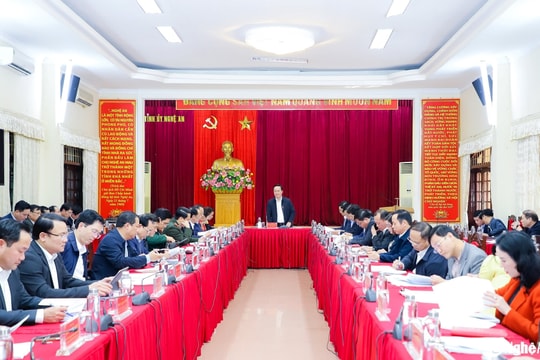
.jpg)
